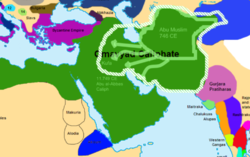747
| القرون: | قرن 7 · قرن 8 · قرن 9 |
| العقود: | ع710 ع720 ع730 ع740 ع750 ع760 ع770 |
| السنوات: | 744 745 746 747 748 749 750 |
| ألفية: | الألفية 1 |
|---|---|
| قرون: | القرن 7 – القرن 8 – القرن 9 |
| عقود: | عقد 710 عقد 720 عقد 730 – عقد 740 – عقد 750 عقد 760 عقد 770 |
| سنين: | 744 745 746 – 747 – 748 749 750 |
| 747 حسب الموضوع | |
| السياسة | |
| زعماء الدول – الدول ذات السيادة | |
| تصنيفات المواليد والوفيات | |
| المواليد – الوفيات | |
| تصنيفات التأسيسات والانحلالات | |
| تأسيسات – انحلالات | |
| التقويم الگريگوري | 747 DCCXLVII |
| آب أوربه كونديتا | 1500 |
| التقويم الأرمني | 196 ԹՎ ՃՂԶ |
| التقويم الآشوري | 5497 |
| التقويم البهائي | −1097 – −1096 |
| التقويم البنغالي | 154 |
| التقويم الأمازيغي | 1697 |
| سنة العهد الإنگليزي | N/A |
| التقويم البوذي | 1291 |
| التقويم البورمي | 109 |
| التقويم البيزنطي | 6255–6256 |
| التقويم الصيني | 丙戌年 (النار الكلب) 3443 أو 3383 — إلى — 丁亥年 (النار الخنزير) 3444 أو 3384 |
| التقويم القبطي | 463–464 |
| التقويم الديسكوردي | 1913 |
| التقويم الإثيوپي | 739–740 |
| التقويم العبري | 4507–4508 |
| التقاويم الهندوسية | |
| - ڤيكرام سامڤات | 803–804 |
| - شاكا سامڤات | 669–670 |
| - كالي يوگا | 3848–3849 |
| تقويم الهولوسين | 10747 |
| تقويم الإگبو | −253 – −252 |
| التقويم الإيراني | 125–126 |
| التقويم الهجري | 129–130 |
| التقويم الياباني | Tenpyō 19 (天平19年) |
| تقويم جوچى | N/A |
| التقويم اليوليوسي | 747 DCCXLVII |
| التقويم الكوري | 3080 |
| تقويم مينگوو | 1165 قبل جمهورية الصين 民前1165年 |
| التقويم الشمسي التايلندي | 1290 |
Year 747 (DCCXLVII) was a common year starting on Sunday (link will display the full calendar) of the Julian calendar. The denomination 747 for this year has been used since the early medieval period, when the Anno Domini calendar era became the prevalent method in Europe for naming years.
أحداث
حسب المكان
الامبراطورية البيزنطية
- الحرب البيزنطية-العربية: الإمبراطور قسطنطين الخامس يدمر الأسطول العربي مقابل قبرص، بمساعدة سفن من المدن-الدول الإيطالية، كاسراً القوة البحرية للخلافة الأموية.[1]
أوروپا
- 15 أغسطس - كارلومان، عمدة القصر في أستراسيا، يتخلى عن منصبه لـ majordomo, وانسحب من الحياة العامة. وتقاعد إلى دير قريب من روما، being tonsured by Pope Zachary، ويترك أخاه پيپان القصير كحاكم أوحد (أمر واقع) على مملكة الفرنجة.
- الطاعون الدبلي يتفشى في صقلية، كالابريا (جنوب إيطاليا)، وMonemvasia (اليونان الحالية).
الدولة الأموية
- 18 يناير - زلزال في بلاد الشام.
- 9 يونيو - الثورة العباسية: أبو مسلم الخراساني، المعتوق الفارسي الذي أصبح قائداً عسكرياً، يبدأ ثورة عامة على الحكم الأموي، والتي شنها تحت شعار الراية السوداء. نحو 10,000 مسلم، أساساً فرس خراسان كانوا تحت إمرته، حين بدأ القتال رسمياً في مرو (تركمانستان الحالية).
آسيا
- القوات الصينية بقيادة گاو شيانژي (كوري في خدمة تانگ) تهزم العرب والتبتيين، بتجريدات عسكرية خاطفة عبر جبال پامير و هندوكوش. نحو 72 مملكة محلية هندية وصغدية تصبح دولاً تابعة لتانگ. وفي العامين التاليين أرسى سيطرة كاملة على شرق آسيا.[2]
- الإمبراطور شوان زونگ يلغي عقوبة الإعدام في الصين، في عهد أسرة تانگ (تاريخ تقريبي).
- الامبراطورة كوميو تؤسس معبد شين-ياكوشي-جي البوذي في نارا (اليابان).
مواليد
- أبو العتاهية - الشاعر العربي العباسي.
- الواقدي، أحد أشهر المؤرخين العرب.
- Benedict of Aniane، Frankish monk (تاريخ تقريبي)
- شارلمان، ملك وامبراطور الفرنجة (أو 748)
وفيات
- 16 مايو - Petronax، Italian monk and abbot (و. 675)
- 13 أغسطس - Wigbert، Anglo-Saxon monk
- 26 أكتوبر - Witta of Büraburg، Anglo-Saxon missionary
مجهولة التاريخ
- محمد بن المنكدر، من التابعين. (و. 51 هـ)
- Cú Chuimne، Irish monk
- Dunn، bishop of Rochester
- Fiachna ua Maicniadh، Irish abbot
- Li Shizhi، chancellor and poet of the Tang Dynasty
- سليمان بن هشام، قائد عسكري عربي.
- قتلغ الأول بيلگه پيلو، خاقان خاقانية الأويغور.
المراجع
- ^ Pryor & Jeffreys 2006, p. 33.
- ^ New Book of Tang, vol. 135
All content in this article is created by Marefa contributors and is © Marefa. All rights reserved.
